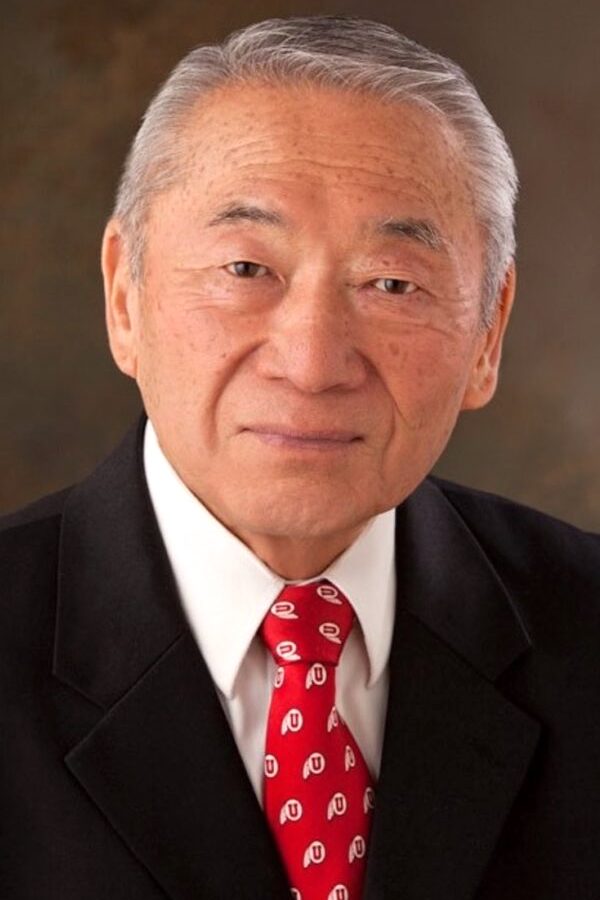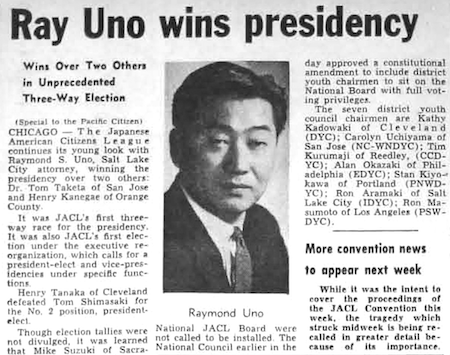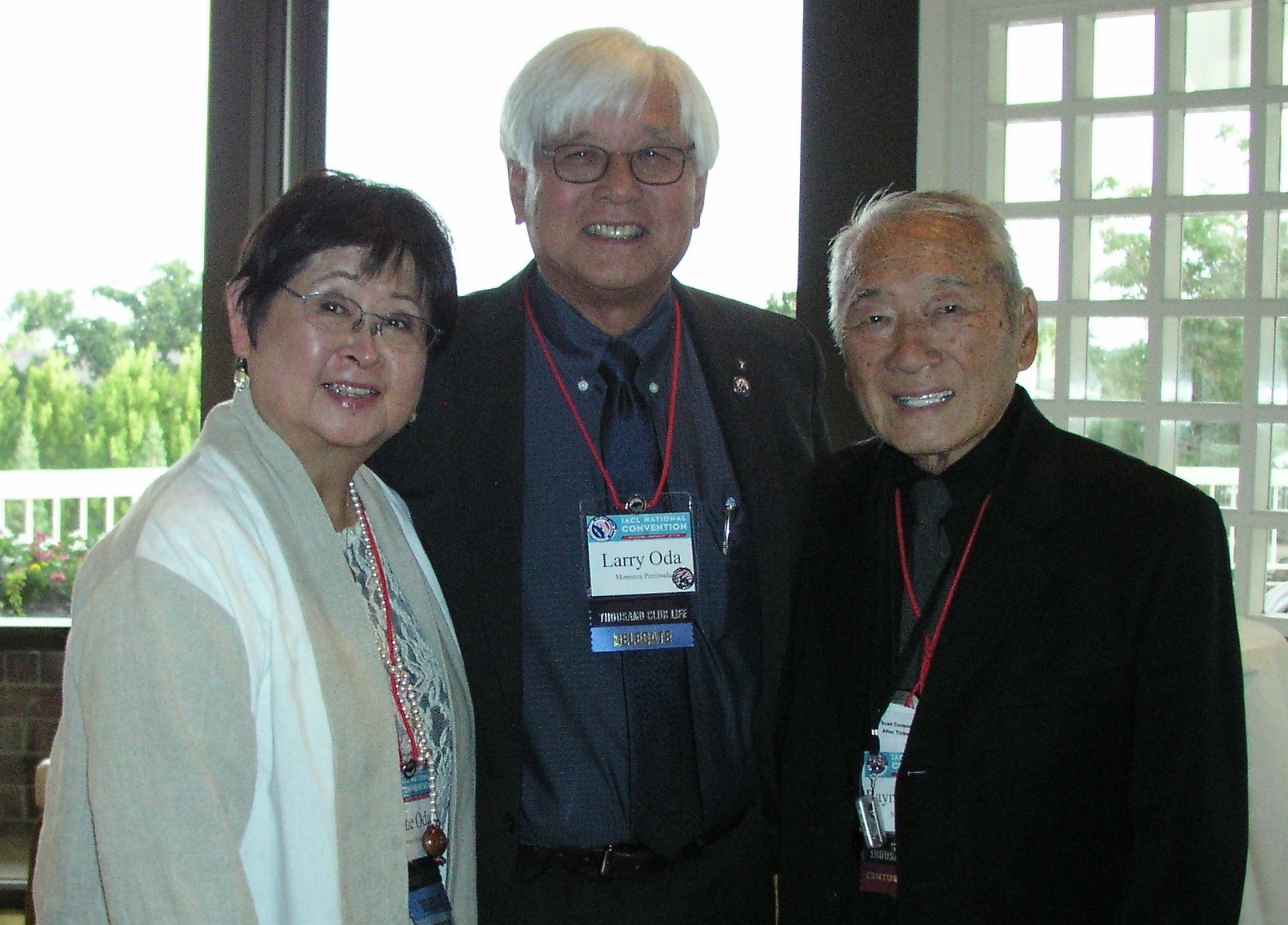Incarcerated as a boy in Heart Mountain, he also served as JACL national president.
By P.C. Staff

Raymond S. Uno
Raymond Sonji Uno, an Ogden, Utah-born Nisei who spent part of his boyhood in an American concentration camp but whose accomplishments included becoming a civil rights advocate, serving as Utah’s first minority judge and in 1970, the youngest person ever elected to the office of national president of the Japanese American Citizens League, died March 8 at Salt Lake City’s Veteran’s Hospital. He was 93.
Larry Oda, who served as JACL national president from 2006–10 and currently serves again in the same capacity, said, “Ray was our longest-lived national president, having served in 1970–72, and was a fixture at many of our activities. He was instrumental in forming the Past Presidents Council to have the past presidents stay involved in the well-being of the organization. I’ll miss him.”
“We have lost a truly great man,” said Japanese American National Museum President and CEO Ann Burroughs. “It was our privilege to host the Uno family reunion at JANM last year when they gathered to stamp the Ireichō. Our deepest condolences go to his family during this time of great sadness.”
The College of Law of his alma mater, the University of Utah, in a statement said it mourned “the passing of retired Judge Raymond Uno — a Utah Law alumnus, the first minority judge in Utah, and a towering figure in the state’s legal community.”
According to his autobiography, Ray Uno was born “in a Yellow cab before it reached the hospital on Dec. 4, 1930” — he was named after the cabdriver — to Osako Teraoka Uno, of Okayama Prefecture, Japan, and Clarence Hachiro Uno, of Kanagawa Prefecture, Japan.
His father served with the American Expeditionary Forces to France in World War I and before he died at 47 while incarcerated with his family at the Heart Mountain War Relocation Authority Center in Wyoming on Jan. 21, 1943, the elder Uno had become Utah’s first Japanese national to become a naturalized U.S. citizen in 1936. This was thanks to an act of Congress that allowed aliens ineligible for naturalization to gain citizen status so long as the person had enlisted in the U.S. Army before April 6, 1917, and served before the Nov. 11, 1918 Armistice, had been honorably discharged and was a U.S. resident.
In his memoir, Uno wrote that his family had moved to California’s San Gabriel Valley in 1939 when his father “got a job as the secretary of the Japanese Association of San Gabriel Valley.” The lives of the Uno family forever changed, along with those of tens of thousands of other ethnic Japanese living along the West Coast after Imperial Japan attacked Pearl Harbor in December 1941, followed by President Roosevelt’s Executive Order in February 1942.
“Our family was first rounded up with others and loaded on army trucks or buses and taken to the Pomona Assembly Center located on the Pomona Fair Grounds in Pomona, California,” Uno wrote. “After around 3 months, we were removed by troop train to a place called Heart Mountain Wyoming, a place I called ‘a concentration camp.’ ”
Following the end of WWII, Uno enlisted in the Army in 1948 and was assigned to the Military Intelligence Language School, and later was transferred to Japan where he served with the 319th Military Intelligence Service, General Headquarters, in Tokyo, spending three months in advanced Japanese language training. “When the Korean War started, I interrogated Japanese prisoners of war repatriated from Russia and did liaison work with local police monitoring communist activity in the community in the prefecture of Tochigi. I was discharged May 22, 1952 with the rank of corporal,” Uno wrote.
Using the GI Bill, Uno earned an associate’s degree from Weber Junior College and then transferred to the University of Utah, earning a bachelor’s degree in political science, followed by earning a juris doctor degree. “Since I had no interest in practicing law, I looked for various kinds of work, and started selling encyclopedias. I eventually found a job as a caseworker with the Salt Lake County Welfare Department. While employed there, I applied and was awarded a stipend and accepted by the Graduate School of Social Work at the University of Utah in 1960.
“My first year, my field work was with the probation department of the Juvenile Court. After two years, I graduated and received my Masters in social work. I then became a caseworker at the Salt Lake County Welfare Department in Salt Lake City,” he wrote.
Uno’s path toward a judgeship began in 1963, when he was appointed to the position of referee of the Juvenile Court in Utah, followed by an appointment as Utah’s deputy county attorney — in both cases Uno being the first ethnic minority to hold those positions. “I was appointed an assistant Utah attorney general by Utah Attorney General Phil Hansen and served from 1965 to 1969,” he wrote. Stepping away from AG’s office, he went into private practice from 1969–76, forming the firm Madsen, Uno and Cummings.

Page one story from the July 24, 1970 Pacific Citizen about Uno’s election as JACL national president.
It was during that time Uno was elected JACL national president in Chicago in July 1970. Prior to that, he had participated in JACL as the Salt Lake City JACL Chapter president, as well as the youth commissioner of the now-defunct Jr. JACL. His accomplishment — becoming elected JACL’s leader at age 39 and defeating Dr. Tom Taketa and Henry Kanegae in JACL’s first three-way race for the office — was overshadowed by tragedy when 18-year-old Evelynn Okubo, a Jr. JACL member, was slain in her room the Palmer House hotel, where convention-goers were staying. Surviving the attack was roommate Ranko Yamada.
In May 1976, even though a “judgeship was not even close to anything I was thinking about at the time,” Uno wrote that Salt Lake City Mayor Ted Wilson had tapped him for the Salt Lake Court bench. In 1984, he won the race for Third District Court and retired as its senior judge in 1990. Nevertheless, he wrote that he was “able to keep abreast of what was happening judicially because after I retired, I became a Senior Judge and heard cases until 2003.”
Of his time serving as a judge, Uno wrote, “My 25 years on the bench were some of my most exciting, challenging, rewarding, and stressful times of my life; particularly, during my term as a district court judge. It was the crown jewel of my life on this earth and I would not exchange it for any price.”

Anne Oda, Larry Oda and Raymond Uno at the 2019 JACL National Convention in Salt Lake City (Photo: George Toshio Johnston)
In 1991, when the Utah Minority Bar Assn. was founded, Uno served as its first president. The government of Japan would in 2012 recognize him when the consul general of Japan in Denver awarded him with a Foreign Minister’s Commendation for promoting mutual understanding between Japan and the U.S.
Of his parents, Uno wrote: “I owe a lot to my mother, Osako Teraoka Uno who lived a long and fruitful life.” She died in 1995 at 101, having lived with her son for the last 36 years of her life. Uno noted that before his father died, he had been “very active in community in the camp. He was member of the Draft Board, active in the USO, and other community things.”
Uno was also predeceased by his brother, Wallace Ichiro (Wally) Uno, and sister Yuki Alma Tomomatsu. His survivors include his wife, Yoshiko, and his five sons Tab (Bobby), Kai (Sheri), Mark (Kris), Sean and Lance and grandchildren Drue, Taylor, Summer, Sam, KT and Jax.
A celebration of life for Uno is slated for 9:30 a.m.–1 p.m. on Saturday, April 20 at the University of Utah Eccles Alumni House.



